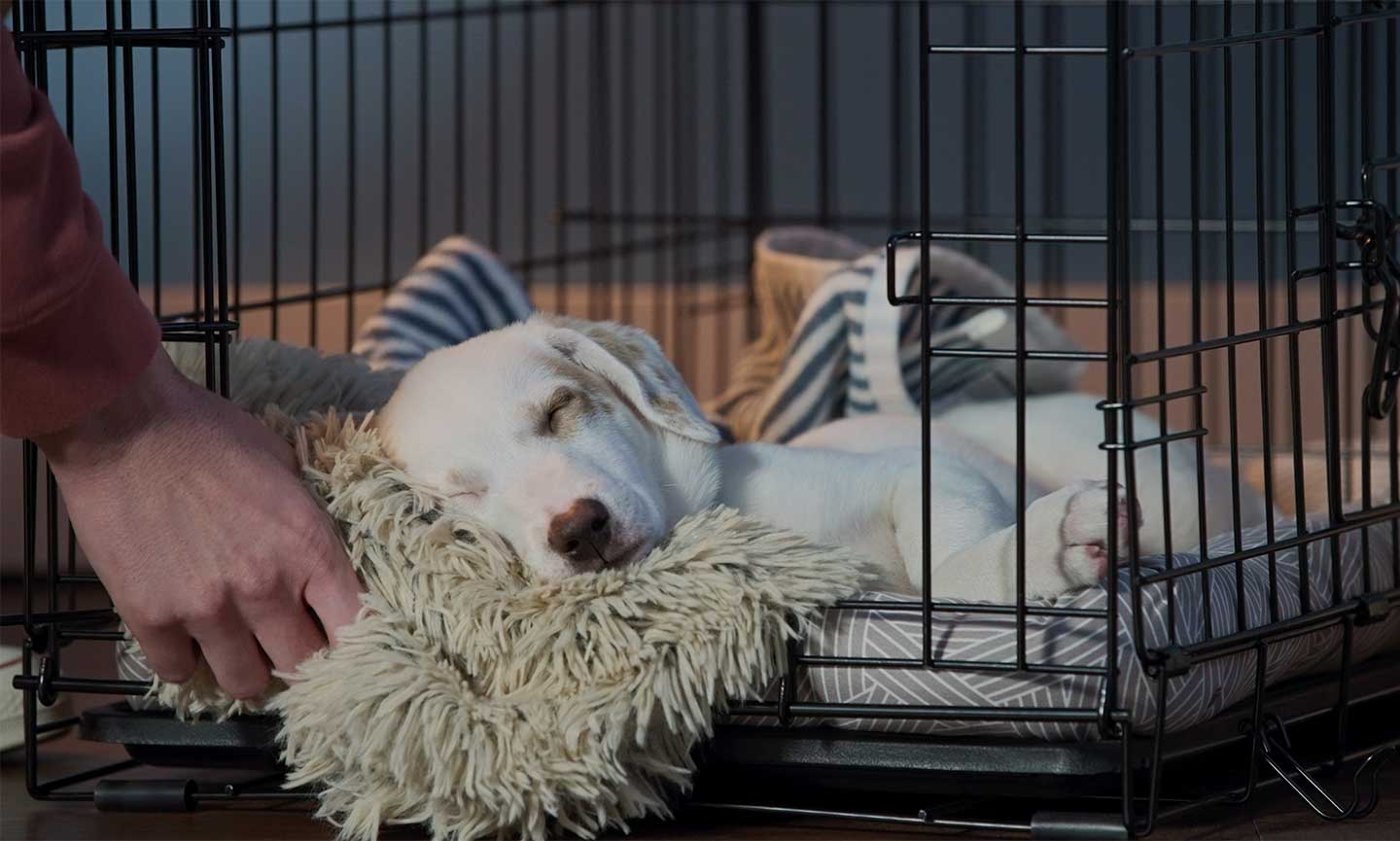To help your dog sleep at night, you can give them mild herbs like valerian or passionflower, an hour before bedtime. Another option is melatonin, a safe supplement recommended by the American Society for the Prevention of Cruelty to Animals (ASPCA).
However, it’s important to consult with a holistic veterinarian or your regular vet to determine the right dose for your dog’s size. Giving your dog sleeping pills without professional guidance should be avoided. Additionally, establishing a consistent bedtime routine and creating a calm environment can also help your dog settle down and sleep through the night.

Credit: www.healthline.com
Understanding Canine Insomnia
Just like humans, dogs can also experience trouble falling asleep and staying asleep. Canine insomnia, or sleeplessness in dogs, can be caused by various factors and can have detrimental effects on their overall well-being. It’s important for dog owners to recognize the symptoms and understand the causes of insomnia in dogs to help them find effective solutions. In this article, we will delve into the causes, effects, and common symptoms of canine insomnia.
Causes Of Insomnia In Dogs
There can be multiple causes behind insomnia in dogs. Some common factors include:
- Stress or anxiety due to environmental changes or separation anxiety
- Pain or discomfort from injuries, health conditions, or aging
- Side effects of certain medications or treatments
- Unsuitable sleeping environment, such as noisy surroundings or uncomfortable bedding
- Underlying medical conditions like thyroid problems or neurological disorders
It’s important to identify the root cause of insomnia in your dog to effectively address the issue and provide them with a restful night’s sleep.
Effects Of Insomnia On Dogs
Insomnia can have negative effects on the overall health and well-being of dogs. Lack of quality sleep can lead to:
- Decreased energy levels
- Irritability and mood changes
- Impaired immune system
- Cognitive dysfunction
- Increased risk of accidents or injuries due to fatigue
It is essential to address canine insomnia promptly to ensure your furry friend stays healthy and happy.
Common Symptoms Of Canine Insomnia
If you suspect your dog may be suffering from insomnia, watch out for these common symptoms:
- Restlessness or pacing during the night
- Frequent waking or inability to fall asleep
- Excessive daytime sleepiness or lethargy
- Increased irritability or aggression
- Changes in appetite or weight
- Difficulty concentrating or decreased alertness
- Excessive panting or rapid heartbeat
If your dog is experiencing any of these symptoms, it’s crucial to consult with a veterinarian to determine the underlying cause and explore appropriate treatment options.
Natural Remedies For Canine Insomnia
In this section, we will explore natural remedies for canine insomnia, focusing on herbs, melatonin as a safe supplement, and other calming solutions. If your dog has trouble sleeping at night, these natural remedies might help them relax and get better rest.
Herbs For Promoting Sleep
Herbs such as valerian and passionflower can have a relaxing and calming effect on dogs, making them helpful for canine insomnia. Giving these mild herbs to your dog about an hour before bedtime can promote better sleep. However, it’s important to consult with a holistic veterinarian to determine the correct dosage based on your dog’s size.
Melatonin As A Safe Supplement
Melatonin, according to the American Society for the Prevention of Cruelty to Animals (ASPCA), is a safe supplement that can be given to dogs to promote sleep. It carries little risk of harmful side effects, with lethargy upon waking being the most common side effect. To ensure the proper dosage, it’s recommended to consult with a veterinarian and use melatonin specifically made for pets.
Other Calming Solutions
In addition to herbs and melatonin, there are other calming solutions you can try to help your dog sleep better at night. Establishing a consistent bedtime routine can signal to your dog that it’s time to settle down and relax. Avoid stimulating activities late at night and provide a calm environment by turning off the lights slightly earlier. You can also explore other natural remedies like CBD oil, which can have soothing effects on dogs.
When it comes to helping your dog sleep better at night, natural remedies can be a safe and effective solution. Incorporating herbs, melatonin, and other calming solutions into your dog’s routine can promote relaxation and improve their overall sleep quality.
Remember to always consult with a veterinary professional before introducing any new supplements or remedies to your dog’s routine. What works for one dog may not work for another, and a professional can provide guidance specific to your dog’s needs and health condition.
Considering Medications For Canine Insomnia
For dog owners who have tried other remedies without success, considering medications for treating canine insomnia may be the next step. However, it is crucial to be aware of the risks associated with giving sleeping pills to dogs and to consult a veterinarian for guidance. Additionally, it is essential to understand the safe dosage of melatonin for dogs if the decision is made to use this supplement.
Risks Of Giving Sleeping Pills To Dogs
Administering sleeping pills to dogs without professional guidance can have serious consequences. Dogs may experience hyperactivity, aggression, severe sedation, and an overall imbalance. To ensure your furry friend’s safety, it is crucial to avoid giving sleeping pills to your dog without consulting a veterinarian first.
Consulting A Veterinarian For Guidance
When considering medications for canine insomnia, seeking guidance from a veterinarian is essential. They can assess your dog’s specific needs and recommend the most suitable course of treatment. The veterinarian may suggest alternative remedies or prescribe medications that are safe and effective for your dog’s insomnia.
Safe Dosage Of Melatonin For Dogs
Melatonin is often considered a safe supplement for dogs with insomnia, but it is important to administer the correct dosage. It is recommended to consult your veterinarian to determine the appropriate dosage based on your dog’s size and condition. While melatonin made for humans can be used, it is advisable to opt for products specifically designed for pets to ensure their safety and well-being.

Credit: www.helpguide.org

Credit: be.chewy.com
Frequently Asked Questions Of What Can I Give My Dog To Sleep At Night
What Natural Remedies Can I Give My Dog To Sleep At Night?
Mild herbs like valerian and passionflower can help your dog sleep at night. Consult a holistic veterinarian for the right dosage. Melatonin is also a safe supplement for dogs, but consult a vet for proper dosage. Avoid giving sleeping pills to your dog without veterinary advice.
What Human Medicine Is Good For Dogs To Sleep?
Melatonin is a safe supplement for dogs to sleep. It has minimal side effects and can help your dog fall asleep. However, it’s best to consult with a holistic veterinarian for the right dosage. Avoid giving your dog human sleeping pills without consulting a vet.
Can You Give A Dog A Sleeping Tablet?
Giving a dog a sleeping tablet can be risky and should be avoided without consulting a veterinarian first. Sleep aids can cause harmful side effects such as hyperactivity, aggression, sedation, and imbalance. It’s best to explore natural remedies like herbs or consult a vet for safe options.
Can You Give Your Dog Human Melatonin?
Yes, you can give your dog human melatonin, but it is important to consult with a veterinarian for the proper dosage. It’s best to use melatonin specifically made for pets.
Conclusion
There are several natural remedies and safe options that you can give your dog to help them sleep at night. Mild herbs like valerian and passionflower can have a calming effect on your dog and aid in falling asleep. Additionally, melatonin can be a safe supplement to give to your dog, but it’s important to consult with a veterinarian for the appropriate dosage.
Remember to avoid giving your dog sleeping pills without professional guidance. With the right approach and the use of these remedies, you can help your dog achieve a peaceful night’s sleep.



